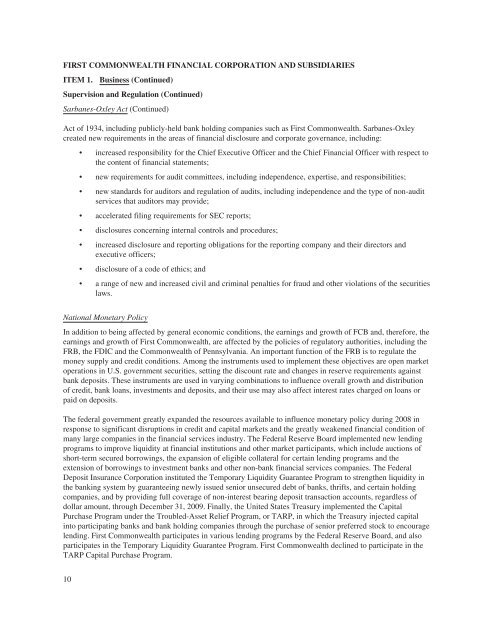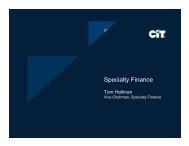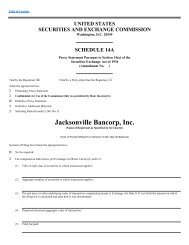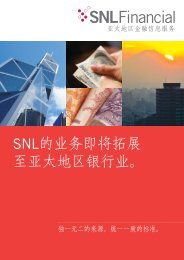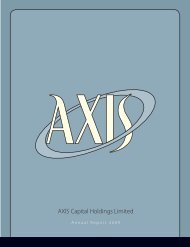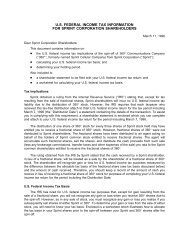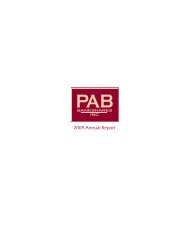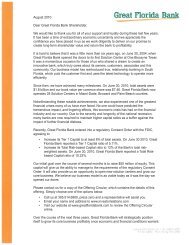Strength and Stability - SNL Financial
Strength and Stability - SNL Financial
Strength and Stability - SNL Financial
Create successful ePaper yourself
Turn your PDF publications into a flip-book with our unique Google optimized e-Paper software.
FIRST COMMONWEALTH FINANCIAL CORPORATION AND SUBSIDIARIES<br />
ITEM 1. Business (Continued)<br />
Supervision <strong>and</strong> Regulation (Continued)<br />
Sarbanes-Oxley Act (Continued)<br />
Act of 1934, including publicly-held bank holding companies such as First Commonwealth. Sarbanes-Oxley<br />
created new requirements in the areas of financial disclosure <strong>and</strong> corporate governance, including:<br />
• increased responsibility for the Chief Executive Officer <strong>and</strong> the Chief <strong>Financial</strong> Officer with respect to<br />
the content of financial statements;<br />
• new requirements for audit committees, including independence, expertise, <strong>and</strong> responsibilities;<br />
• new st<strong>and</strong>ards for auditors <strong>and</strong> regulation of audits, including independence <strong>and</strong> the type of non-audit<br />
services that auditors may provide;<br />
• accelerated filing requirements for SEC reports;<br />
• disclosures concerning internal controls <strong>and</strong> procedures;<br />
• increased disclosure <strong>and</strong> reporting obligations for the reporting company <strong>and</strong> their directors <strong>and</strong><br />
executive officers;<br />
• disclosure of a code of ethics; <strong>and</strong><br />
• a range of new <strong>and</strong> increased civil <strong>and</strong> criminal penalties for fraud <strong>and</strong> other violations of the securities<br />
laws.<br />
National Monetary Policy<br />
In addition to being affected by general economic conditions, the earnings <strong>and</strong> growth of FCB <strong>and</strong>, therefore, the<br />
earnings <strong>and</strong> growth of First Commonwealth, are affected by the policies of regulatory authorities, including the<br />
FRB, the FDIC <strong>and</strong> the Commonwealth of Pennsylvania. An important function of the FRB is to regulate the<br />
money supply <strong>and</strong> credit conditions. Among the instruments used to implement these objectives are open market<br />
operations in U.S. government securities, setting the discount rate <strong>and</strong> changes in reserve requirements against<br />
bank deposits. These instruments are used in varying combinations to influence overall growth <strong>and</strong> distribution<br />
of credit, bank loans, investments <strong>and</strong> deposits, <strong>and</strong> their use may also affect interest rates charged on loans or<br />
paid on deposits.<br />
The federal government greatly exp<strong>and</strong>ed the resources available to influence monetary policy during 2008 in<br />
response to significant disruptions in credit <strong>and</strong> capital markets <strong>and</strong> the greatly weakened financial condition of<br />
many large companies in the financial services industry. The Federal Reserve Board implemented new lending<br />
programs to improve liquidity at financial institutions <strong>and</strong> other market participants, which include auctions of<br />
short-term secured borrowings, the expansion of eligible collateral for certain lending programs <strong>and</strong> the<br />
extension of borrowings to investment banks <strong>and</strong> other non-bank financial services companies. The Federal<br />
Deposit Insurance Corporation instituted the Temporary Liquidity Guarantee Program to strengthen liquidity in<br />
the banking system by guaranteeing newly issued senior unsecured debt of banks, thrifts, <strong>and</strong> certain holding<br />
companies, <strong>and</strong> by providing full coverage of non-interest bearing deposit transaction accounts, regardless of<br />
dollar amount, through December 31, 2009. Finally, the United States Treasury implemented the Capital<br />
Purchase Program under the Troubled-Asset Relief Program, or TARP, in which the Treasury injected capital<br />
into participating banks <strong>and</strong> bank holding companies through the purchase of senior preferred stock to encourage<br />
lending. First Commonwealth participates in various lending programs by the Federal Reserve Board, <strong>and</strong> also<br />
participates in the Temporary Liquidity Guarantee Program. First Commonwealth declined to participate in the<br />
TARP Capital Purchase Program.<br />
10


